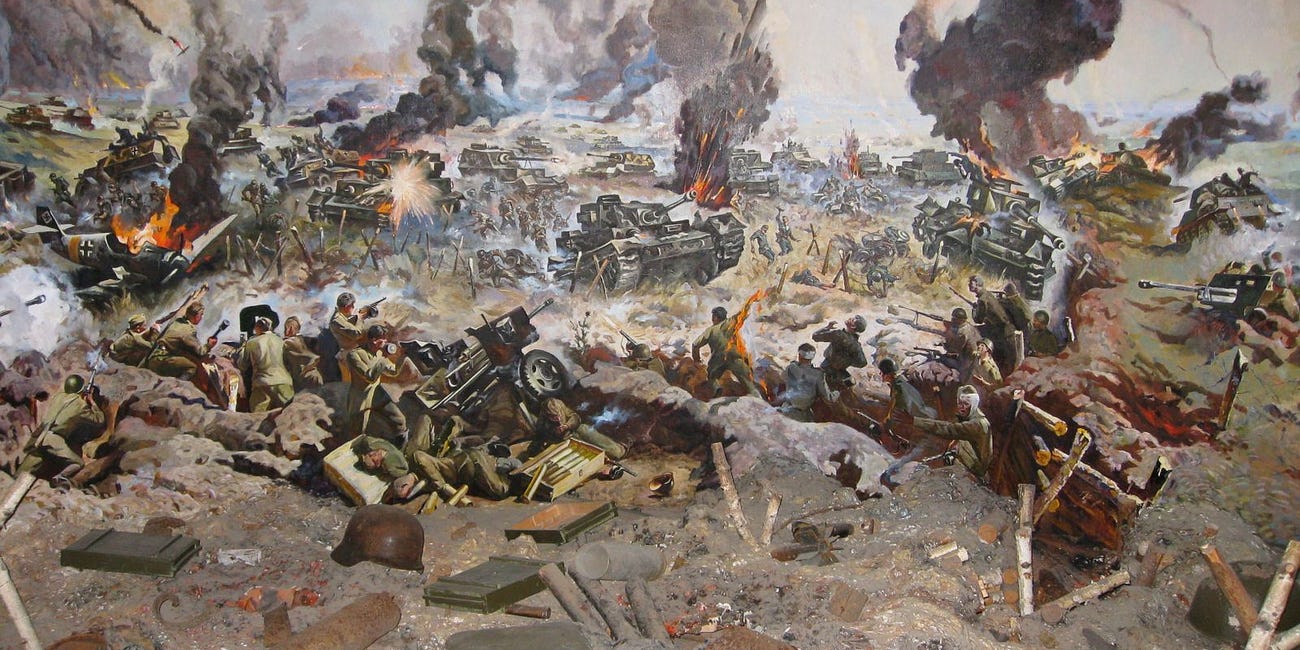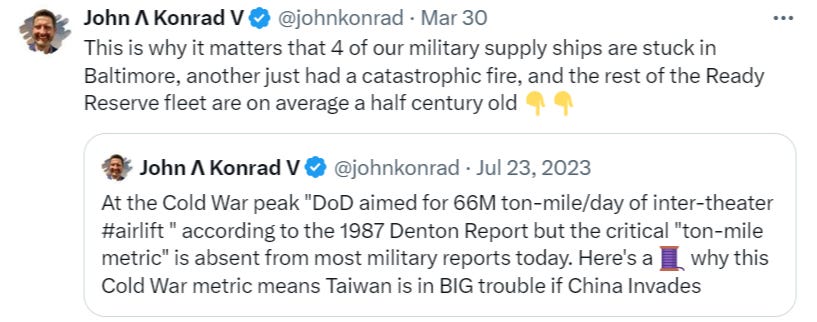I wanted to do a relatively brief post mostly devoted to this extraordinary new talk by Jacques Baud with the Duran folks, Mercouris and Christoforou:
If you haven’t seen this yet, watch at least the first half hour, or a little more, which is the most profoundly meaningful stretch. Incidentally, according to his wiki, today just happens to be Mr. Baud’s birthday as well, so happy birthday to him.
Jacques Baud worked in military intelligence, studying the Soviet way of fighting in the Cold War, and recounts his most poignant observations in the differences between how Russia and the West conduct warfare. The reason I found it particularly enjoyable is because it accords so well with my own theories, particularly in articles like this one:
And thus feels like a bit of vindication, in that sometimes I’ve felt the lone reed bending in the wind, and it’s often discouraging or at least exhausting to realize that the vast majority of the commentariat simply doesn’t comprehend the clashing philosophies, which inevitably undermines their analyses.
Mr. Baud eloquently corroborates the Russian holistic approach to war, noting that it has not changed much since Soviet times. In his estimations, it is a very methodical and analytical approach, but also one—almost contradictorily—treated and studied as an art form, thus the moniker ‘Operational Art’.
His most paradigm-breaking assessments revolve around how Russia approaches the planning of wars around a strategic and operational framework, whereas the West sort of rudderlessly flounders “in the moment”, and has exhibited little conception of military operations beyond the tactical. Elucidating points include Baud’s explanation of the West’s actions in various African and MidEast theaters as just guys going around shooting guns, with little strategic depth or focus on end goals beyond that.
Of course, he may or may not miss the fact that this is to some extents by design, in the spirit of the famous quips about America’s MidEast wars not being fought to be won, but rather to make money for defense contractors. But whatever the actual originating reason is, it doesn’t dismiss the fact that the West’s strategic and operational sense for the battlefield has likely well atrophied as a result. Whether you’re doing something ‘intentionally’ or not, if you do it long enough, you will degrade your institutional ability to operate otherwise.
The only thing to the contrary I’ll say, in the effort of tempering any wild flights of exaggeration to one extreme or the other, is that things are not as clear cut and uniform as simply: “Russia is the best, West is totally clueless.”
We know there are gradations of each on both sides. There are some Russian generals that make even modern Western generals look like Napoleon, and the war has revealed some incredibly deep corrosion within segments of the Russian Armed Forces. We’ve seen endless blunders and miscalculations from Russian forces at every tier of command, and there are many gaps and blind spots in the Russian approach to war. No one has the one-size-fits-all perfect system—if they did, that country would likely rule the world unchallenged.
But it’s in the cumulative sense of the armed forces as a whole, living, breathing organism, we can say without too much exaggeration that in the current historical frame, Russia appears to much better grasp the most fundamental and important precepts of winning real wars compared to the West. We see this categorically demonstrated, for example, in the Russian vision of warfare consistently winning out and being proven superior over the approach of the West in the SMO.
For instance, the West’s philosophy of concentrating on prestige, precision systems for ‘surgical’ victories has now undoubtedly been trumped by Russia’s revival of the conventional ‘mass production war’.
In the clash of philosophies in armor, Russia’s approach to its tanks has likewise seemingly proven its superiority as Western tanks are now roundly deemed inadequate for modern peer combat. Same goes for many other advanced and expensive weapons systems.
In the clash of organizational philosophies it may be less clear, but the long-celebrated Western approach to NCO-heavy “small unit leadership” has clearly not shown advantage over Russia’s putatively more ‘centralized’ force structure.
Clearest of all, of course, has been the question of strategic and operational approach. I’ve written before how the Western-led Ukrainian forces have not once been able to envelop Russians in a single cauldron. Meanwhile, Russian generals somehow continually manage to entrap the NATO proxy force in cauldrons in virtually every major battle, leading to incalculably disproportionate losses.
So that is all to say that, while the differences aren’t as clear cut as Mr. Baud’s passionate appeal may suggest, it’s safe to say that the general cut of his comparisons is overall quite accurate. And truth be told, it will likely only get more accurate as time progresses. That’s because the Russian forces are learning and only improving their storied knowledge and strategic culture, while in the West the pillars of this knowledge are being torn down on a daily basis, replaced with DEI indoctrination and other distractingly degrading modern contrivances.
E.g.:
And further look at the cast of clowns and freaks that the West continues to appoint to its highest leadership positions. Even in spite of all its weaknesses and intransigent corruptions, there’s no way Russia will have the worst of it when it comes to the West’s precipitous degradation of military culture.
The easily demonstrable veracity of this is being witnessed on a daily basis. Each new day brings some new shocking news: yesterday it was another US Navy vessel catching fire, today it was the 4th Apache chopper crash in just the past 2 months alone; that’s not to even mention the general state of things—Baltimore bridge, anyone?
And so, to cap this little digest, I want to present this exceptional new article making the rounds, which perfectly dovetails with the overarching thrust of Jacques Baud’s thesis:
The author, David P. Goldman, recounts his attendance last weekend of some kind of Bilderberg-esque meeting on Ukraine—with an indirect reference to Chatham House rules—between various former cabinet members, senior military officials, academics, etc.
The conclave left him unsettled:
I can say that I haven’t been so scared since the fall of 1983, when I was a junior contract researcher doing odd jobs for then Special Assistant to the President Norman A Bailey at the National Security Council. That was the peak of the Cold War and the too-realistic Able Archer 83 exercise nearly set off a nuclear war.
He goes on to relay the blanket of hysterical delusion swaddling the meeting:
“The Russians are taking massive losses of 25,000 to 30,000 a month,” the former official added. “They can’t sustain the will to fight on the battlefield. The Russians are close to a breaking point. Can they sustain their national will? Not if the rigged election [of Vladimir Putin this month] was any indication. Their economy has real vulnerability. We need to redouble sanctions and financial interdiction of supplies getting to Russia. The Russians have a Potemkin portrayal of strength.”
The author refutes the screeching proclamations above:
All the above is demonstrably false and known to be false by the rapporteur in question. The notion that Russia is taking 25,000 to 30,000 casualties a month is ludicrous. Artillery accounts for about 70% of casualties on both sides and by every estimate Russia is firing five or ten times as many shells as Ukraine. Russia has carefully avoided frontal assaults to preserve manpower.
He ends on this final emblematic point—which comes full circle to reinforce Jacques Baud’s entire thesis:
No one disputed the data I presented. And no one believed that Russia is taking 25,000 casualties a month. Facts weren’t the issue: The assembled dignitaries, a representative sampling of the foreign policy establishment’s intellectual and executive leadership, simply couldn’t imagine a world in which America no longer gave the orders.
They are accustomed to running things and they will gamble the world away to keep their position.
In short, there is no Plan B, nor real strategic plan to defeat Russia at all. It’s merely a bricolaged scramble to make sure the West stays in power by any assortment of haphazard, and at times mutually antithetical, means.
Just as Jacques Baud described the extent of the West’s strategic planning in Africa and the MidEast as merely guys aiming and shooting their guns, here too it seems the West has run out of ideas and is desperately trying to fish a victory out of the toilet with a plan designed “by committee”—the only problem is, the committee is comprised of apparatchik headless chickens with no sense of real cohesion or even uniform loyalties; they’re merely united by the vaguely resonant fear of losing their primacy in a world where the rising East increasingly overshadows them. Against a resurgent Russia, united by an existential threat to the homeland, that simply isn’t enough.
A couple random update items.
For those who’ve read my last paywalled report, you’ll know I broke the story of the first ever mechanized ground robot assault. Now, as promised, the story has been updated:
The first drone assault attack in history!
In Berdychi, which is now being taken by Russian troops, field testing of a new promising Russian robotic platform took place.
As part of the combat mission, a group of assault drones took part in supporting the assault operations, ensuring the suppression of Ukrainian positions in the village using the installed AGS-17 grenade launcher modules, firing several hundred grenades. During combat use, drones showed good results. The drones were able to continue operating even in conditions where losses of personnel and expensive equipment from enemy fire would have been inevitable.
The experience gained in combat use will be taken into account for further production and development of the assault robotic platforms. The combat use of such drones in Berdychi is actually similar to the first tank attack during the First World War.
A successful tracked base has great potential for developing a robotic platform for assault with installation of various combat modules and support operations like transportation and installation of mines, evacuation of wounded, transportation of cargo and equipment.
In the future, such platforms will take their place on the battlefield. Despite the fact that there are similar developments in the USA, Britain and China, it was Russia that was the first to use a group of assault drones in a real war.
The future has already arrived.
It turns out the Russian project is producing much more of them than I thought:
We can officially state that the age of ground robot combat has now begun, with Russia inaugurating it with this historic first foray. Unfortunately, it’s clear to see the type of madness the near future will hold, as Ukrainian FPVs were able to waylay the robotic UGVs just as readily as they do sluggish foot soldiers:
While the results remain inconclusive, it’s clear that ground combat will steadily transition to UGV augmented assaults either way. The big concern, as always, is that things will devolve into another set of WWI-like positional stalemates, just this time with robots.
And lastly, ever strengthening its capabilities as I wrote in the last article, today Russia successfully launched another new earth-sensing recon satellite, the Resurs-P, from the Baikonur Cosmodrome in Kazakhstan:
Your support is invaluable. If you enjoyed the read, I would greatly appreciate if you subscribed to a monthly/yearly pledge to support my work, so that I may continue providing you with detailed, incisive reports like this one.
Alternatively, you can tip here: Tip Jar












Way back in 2004, in preparation for Putin's visit to the United States (these were the days of the G8), I was mistakenly invited to attend a big "heads up" meeting with a whole melange of security chiefs that took place in a literal high-tech underground bunker. I say "mistakenly" invited because it was actually my boss who took me along, and he was the legitimate invitee, but he, for whatever reason, thought I should come along, probably because he expected that he'd have to deliver a detailed briefing, and I was better at "talking fancy" than he was.
So there we were, multiple checkpoints, armed soldiers outside, going deep into this bunker which had all kinds of gee-whiz monitors showing stuff, almost like in a movie. And there were military guys there, police guys there, homeland security guys, etc. I got to admit, it was kind of thrilling even though I was like shit, I can't believe they let a fool like me attend this big pow-wow.
Well, all that changed once the big summit or meeting or whatever it was called began. It was nonsense after nonsense, with warnings about terrorists attacking malls, hospitals, bridges, trains, schools, sewage systems, and basically hiding under everyone's bed, and there were a million billion of them out there, all armed to the teeth with chemical weapons and dirty bombs. And all this was based on "intel" and "chatter" and super duper serious high security classified sources etc, etc.
All I could do was laugh my ass off. It was a thousand times more insane than even the wildest blogger would ever post. And two weeks later, I quit that job and moved to Europe.
America and the collective West are "led" by the dumbest morons in history. How they've managed to accomplish anything successfully is beyond my ability to comprehend, other than to note that it's all done by stealing a million dollars' worth of resources from the poor working people of the entire globe to achieve a task worth $1. The rest is just razzle-dazzle bullshit and a smokescreen to cover the fact that the Great and Powerful Oz really is just a pathetic old man standing behind a curtain.
Is Russia incredibly dumb and corrupt at times? Sure, of course. But they're not spaced out lunatics. And that's the real difference.
https://youtu.be/zjIiApN6cfg?si=UtXveA3HTQyguCig
Come and see . A must watch movie about a boy who joins partisans while nazis and banderites ravage the country.